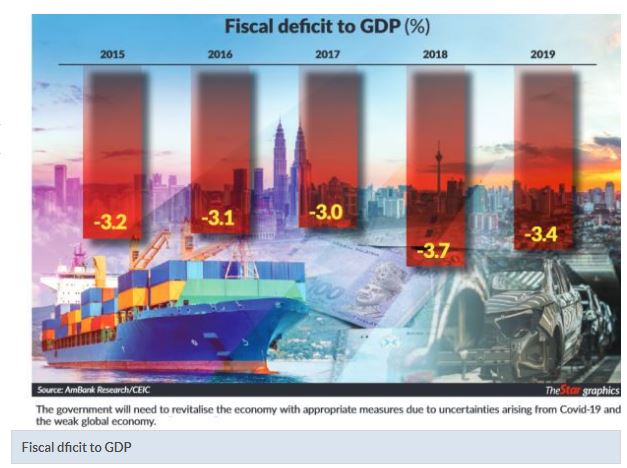Malaysia: Budget 2021 expected to be expansionary
PETALING JAYA: Budget 2021, which will be tabled in November, will be expansionary though narrower than Budget 2020, with economists projecting a budget deficit of 4% to 6% next year.
The government, they said, would need to revitalise the economy with appropriate measures due to the uncertainties arising from the Covid-19 and the weak global economy, which has caused many nations to fall into recession.
The World Bank expects Malaysia’s fiscal deficit to gross domestic product (GDP) to widen to 7% this year, underpinned by increased expenditure and downward pressure on revenue. The government, however, expects the fiscal deficit to be at 5.8% to 6% this year.
Economists expect the government to look into some core areas to ensure Malaysia is on the right track to achieve economic sustainability post-pandemic.
Socio-Economic Research Centre executive director Lee Heng Guie told StarBiz that the federal government is torn between managing a tight fiscal space and keeping the country’s sovereign rating intact.
“In our view, the government should go for another year of fiscal deficit targeted at public spending and programmes as well as the provision of tax incentives and allowances to boost private investment, creating jobs and income.
“Budget 2021 is expected to focus on harnessing the deployment of digital technologies in business and commerce, supporting entrepreneurial endeavours for youths (start-up, sharing economy and agriculture), upskilling and reskilling programmes and targeted incentives for the food sector, logistics, healthcare and telecoms infrastructure, ” he noted.
Sunway University professor of economics Yeah Kim Leng, who is expecting a budget deficit for next year to be in the 4%-6% range, said the Finance Ministry, in consultation with the private sector, has highlighted four focus areas for Budget 2021. They are: caring for the people, steering the economy, enabling sustainable living and enhancing service delivery.
Given the continuing fiscal deficits and the large budget devoted to operating expenditure, he said the thrust to improve the efficiency and effectiveness of the government delivery system in all sectors and functional areas would receive greater impetus in Budget 2021.
The people-oriented thrusts, Yeah said, would likely contain increased allocation for higher direct income support for the “poor” households falling under the revised poverty line, and measures to boost income generation and employment opportunities.
New sources of growth stemming from Industrial Revolution 4.0, digitalisation, green technology and investments in sustainability would likely receive emphasis in steering the economy and enhancing sustainable living next year, Yeah said.
Malaysian Rating Corp Bhd (MARC) chief economist Nor Zahidi Alias (pic below) said since extraordinary times call for extraordinary measures, larger budget deficits are justified to ensure businesses and consumers are well supported.
However, he said, from the investors’ point of view, a critical question is whether the deficit and the debt can be pared down within the targeted time frame – three to four years.
“The main focus of the upcoming budget would be on driving new sources of growth as well as future-proofing Malaysia to ensure its economy will be resilient in the future.
“This will be among effective medium-term measures to engineer economic recovery from the slowdown caused by the pandemic.
“As for immediate-term measures, the government is expected to continue implementing mega projects such as the Light Rail Transit 3, Mass Rapid Transit 2 and East Coast Rail Link to stimulate economic growth. Additional assistance to SMEs can also be expected, ” Zahidi noted.
Bank Islam chief economist Mohd Afzanizam Abdul Rashid said the government should not hastily reduce the budget deficit in 2021 as prioritising spending is very crucial as it would need to maximise the impact from every ringgit spent.
Among the key priorities in the immediate term is job security, especially for sectors that are still affected by the Covid-19 such as tourism-related that relied on foreign tourists like hotels, tour guide, food and beverages and aviation, he said.
He added that there may be a need to extend the Wage Subsidy Programme, which is expected to expire by the end of this month.
Cash transfer programme would also need to be continued, he said, noting that it has to be precisely targeted and the data mining and the delivery system has to be robust.
Afzanizam also stressed on the importance of a social safety net. “A recent Unicef study highlighted that the low income group, especially those who work in the informal sector, does not have EPF and Social Security Organisation (Socso) contributions.
“Perhaps, there should be a campaign among the small business owners to encourage them to register their workers and make the necessary contribution for their employees. Perhaps, contribution by the employers can be initiated on a step up basis, ” he said.
For Budget 2021, OCBC Bank economist Wellian Wiranto expects a narrower deficit in the range of 4.8%-5.2% of GDP.
“While the recent temporary increase of the debt-to-GDP ratio ceiling from 55% to 60% allows for more leeway in fiscal spending, we expect the government to still be telegraphing a general path towards fiscal consolidation.
“As a fiscal normalisation move, the country can hopefully start to exit from the extraordinary circumstances of 2020, ” he said.
OCBC expects economic growth to come in at around 5.5% in 2021, a marked change from the -5.1% that it is projecting this year.
This would be all the more reason for the government to preserve some fiscal space to undertake more stimulus next year, if the situation calls for it, he said.
“In terms of budget specifics, we expect to see a continuation of support schemes to focus on retaining jobs and retraining of workers with new skills to help them find employment opportunities.
“On a more structural basis, tax incentives to encourage businesses to continue their digitalisation initiatives are likely to be present as well, ” he said.
Source: https://www.thestar.com.my/business/business-news/2020/09/21/budget-2021-expected-to-be-expansionary


 Thailand
Thailand





